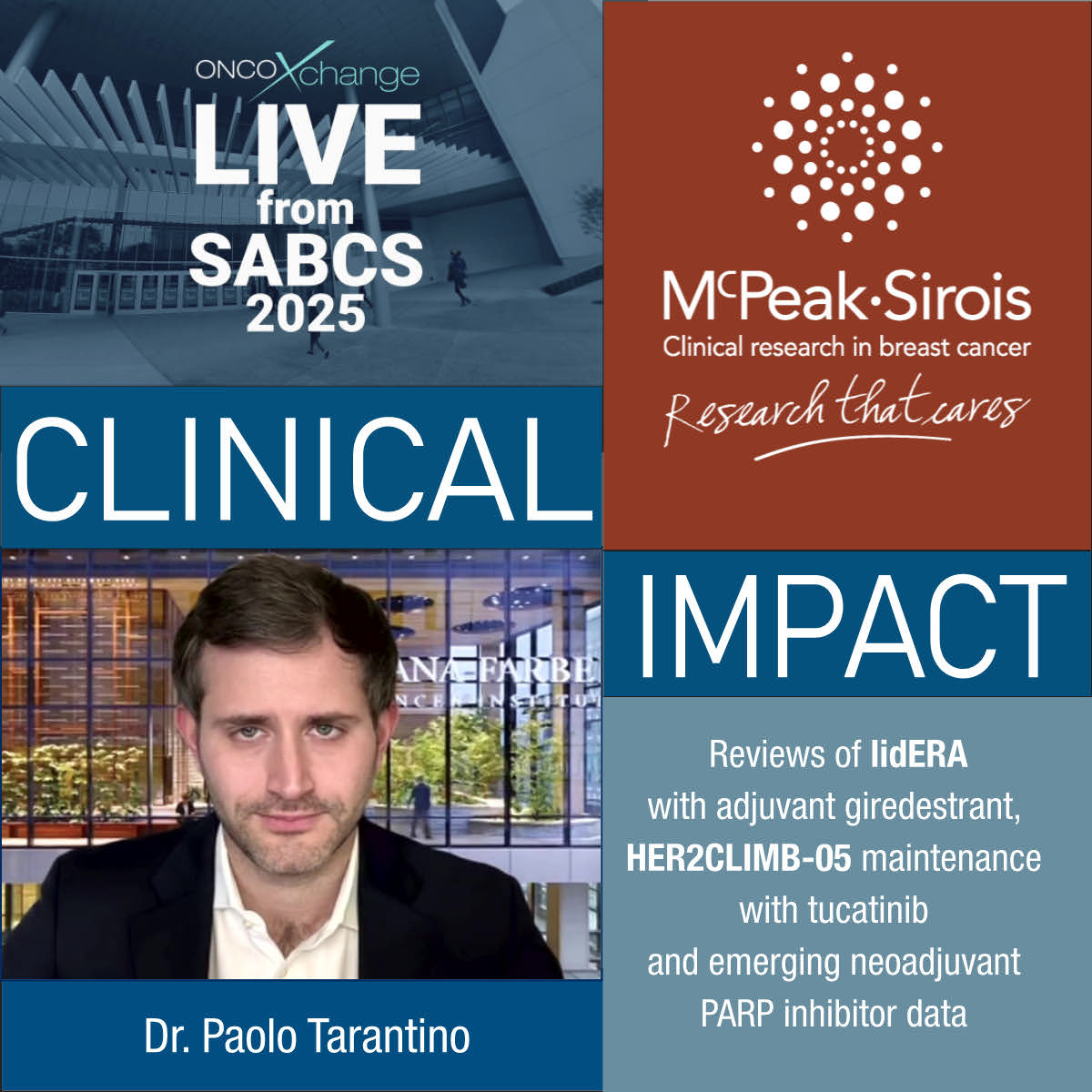
Activity of HER2 antibody-drug conjugate promising in breast cancer pretreated with T-DM1
December 2019
Wayne Kuznar for oncoXchange
Trastuzumab deruxtecan, a novel antibody drug conjugate, induces durable objective responses in heavily pretreated patients with HER2-postive metastatic breast cancer, announced Ian Krop, MD, PhD, at the 2019 San Antonio Breast Cancer Symposium.
In the open-label phase II DESTINY-BREAST01 study, the confirmed objective response rate by independent central imaging was 60.9%, with a median duration of response of 14.8 months, said Dr. Krop, associate chief, Division of Breast Oncology, Dana-Farber Cancer Institute, Boston.
Patients in the trial received a median of six prior lines of cancer therapy, and all were resistant/refractory to T-DM1.
With a median follow-up of 11.1 months, median progression-free survival (PFS) was 16.4 months (95% CI, 1.27-not estimable).
In those with brain metastases, the median PFS was 18.1 months, but with only 24 patients in this subgroup, the confidence interval was wide (95% CI, 6.7-18.1 months), noted Dr. Krop. Median overall survival had not been reached at data cutoff.
“These data demonstrate the potential of trastuzumab deruxtecan to establish a new standard of care for patients with advanced HER2-positive breast cancer,” he said.
“These data are so compelling in that this a heavily pretreated population. To put it context, a PFS of 16 months and a response rate of 60% are roughly double or triple what’s typically seen in other studies in this third and later line population.”
In other studies, in this type of population, typical median PFS is about 4 to 5 months, he said.
Trastuzumab deruxtecan is composed of a HER2-specific monoclonal antibody, with the same amino acid sequence as trastuzumab. It has several distinctive features. Its payload is a potent topoisomerase I linker. “This is a kind of chemotherapy that is not typically used in HER2-positive breast cancer so it’s less likely cancers will develop resistance to this agent,” said Dr. Krop. It has a drug-to-antibody ratio of about 8, which is higher than that typically observed with current antibody conjugates. The payload is also membrane permeable, allowing it to diffuse out of the targeted cell and “kill neighboring tumor cells, regardless of their HER2 expression,” he said.
Patients enrolled in DESTINY-BREAST01 had unresectable or metastatic HER2-positive breast cancer treated with prior TDM-1 and who had no history of significant interstitial lung disease (ILD). Included in the data presentation were 184 patients who were enrolled in cohorts treated with 5.4 mg/kg of trastuzumab deruxtecan, the recommended phase 2 dose.
Data cutoff was August 1, 2019, and 42.9% of patients remain on study treatment. All patients had prior trastuzumab and per protocol, prior T-DM1. Two thirds received prior pertuzumab and 54.3% had other anti-HER2 therapies.
As part of the 60.9% ORR rate, 6.0% of patients had complete response and 54.9% had partial responses. Some 36.4% had stable disease, for a disease control rate of 97.3%. The median time to response was 1.6 months. Less than 2% had progressive disease at the time of first restaging.
The activity of trastuzumab deruxtecan was consistent across all major subgroups, including those patients treated with prior pertuzumab, who had an ORR of 64.5%.
Some 57% of patient had at least one grade-3 adverse event. Treatment-emergent adverse events that resulted in discontinuation occurred in 15.2%. The most common reasons for discontinuation were pneumonitis (n = 11) and ILD (n = 5). There was no clinically significant cardiac toxicity.
Twenty-five patients developed ILD believed to be drug related by an independent adjudication committee, including four patients with fatal ILD.
Of the 25 patients who had ILD of any grade, the median time to investigator-reported onset was 193 days. Thirteen of the 20 patients with grade ≥2 ILD received corticosteroids. Of the four fatal cases of ILD, onset ranged from 63 to 148 days; three of these patients received steroids as part of treatment, and deaths occurred 9 to 60 days after ILD diagnosis. The advice of the expert panel for future studies of trastuzumab deruxtecan is that patients be monitored closely for symptoms of ILD and that trastuzumab deruxtecan be held and the steroid started as soon as ILD was suspected.
Phase III studies of trastuzumab deruxtecan in HER2-expressing breast cancer are ongoing.

Comments (0)